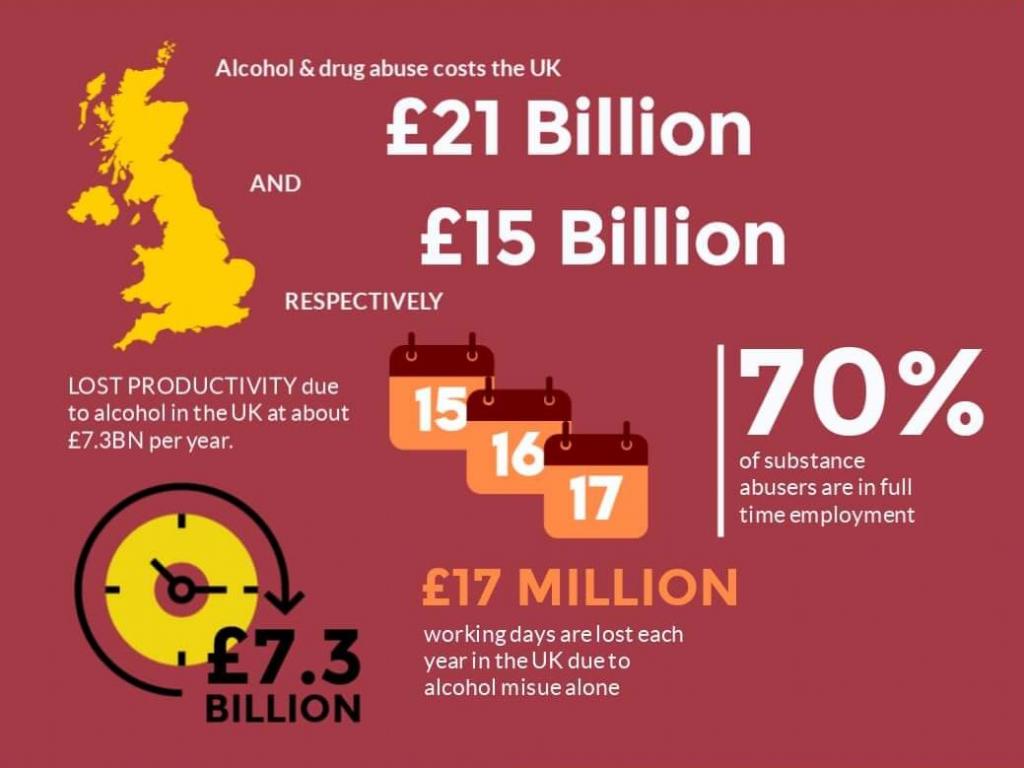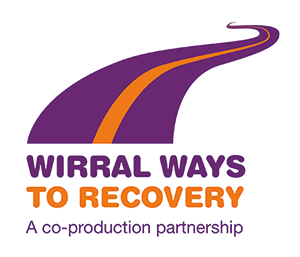Parental Substance Misuse
Introduction
Parental substance misuse can have a significant impact on the safety and wellbeing of children and young people in Wirral. Substance misuse refers to alcohol, illicit drugs and prescription drugs. Substance misuse can consume a great deal of time, money and emotional energy, which will unavoidably impact on the capacity to parent a child. This behaviour also puts the child at an increased risk of neglect and abuse, either by the parent or because the child becomes more vulnerable to abuse by others.
National Serious Case Reviews have identified substance misuse as significant factors in families where children have died or been seriously harmed, along with domestic abuse and parental mental ill health. Substance misuse costs the UK economy £21 billion each year. This, and other costs can be seen in the infographic below.
Training
Wirral Safeguarding Children Partnership run regular training events to upskill the workforce on substance misuse. Please see our dedicated drug and alcohol training page for upcoming dates.
In the run up to the holiday period when alcohol consumption will often increase, but also as learning that came from the ‘Noah’ CSPR, Wirral Ways to Recovery will be delivering 2 Spotlight Sessions on the impact of alcohol use on parenting.
To book onto a session please click on the date you wish to attend:
Risks
Drug or alcohol misuse of a parent can have an impact on children in a number of ways, including:
- Substance misuse in pregnancy may impair the development of an unborn child;
- The risk of physical injury to a child sleeping next to an adult, occurring as a result of the adult lying over or against the child (over lay) is increased if the adult is sedated due to the effects of alcohol and/or prescribed or illicit drugs;
- The risk from drugs and drug equipment being left lying around – there have been a number of cases recently in Wirral where children have ingested methadone that was left unattended
- A parent’s practical caring skills may be diminished by substance misuse;
- Substance misuse, or withdrawal from substance misuse, may give rise to mental health issues or behaviour that put children at risk of injury, psychological/emotional distress or neglect;
- Children’s physical, emotional, social, intellectual and developmental needs can be adversely affected by their parent’s misuse of substances
- Substance misusing parents may find it difficult to prioritise the needs of the children over their own i.e.: health appointments, schooling.
- Children may be introduced to drug and alcohol misuse at an early age by the behaviour of the parents and the availability of the substances within the home.
- Money available to the household to meet basic needs may be reduced;
- Members of the family, including children, may be drawn into criminal activity;
- Children may be at risk of Physical Harm, or death if drugs and drugs paraphernalia are not stored safely and children have access to them;
- Children may be endangered if they are carried as passengers in vehicles driven by a substance misusing parent;
- Children being forced to take on a caring role and feeling they have the responsibility to solve their parent’s, alcohol and drug problems.
- There are potential risks to the child from parental acquaintances or family members if they are also involved in drug/alcohol misuse.
Indicators
The impact of parental substance misuse will vary according to the age and developmental stage of the children. Some children, for example children with physical or learning disabilities or health problems, may be particularly vulnerable and parents who misuse substances may have difficulty in meeting their additional needs. Assessment of the quality of care parents are providing must take into account the needs of each child individually. The Graded Care Profile2 is a useful tool for measuring the level of care given to a child/ children.
Parents may be aware that their substance misuse behaviour has a negative impact on their child and ask for help from practitioners. This is certainly a positive step, however practitioners must ensure that the needs of the parent do not override the needs of the child. Any professionals, carers, volunteers, families and friends who are in contact with a child in a drug / alcohol-misusing environment must ask themselves “What is the child’s daily lived experience like in this environment?”
Substance misuse may affect a parent’s ability to engage with their child. It may also affect a parent’s ability to control their emotions. Severe mood swings and angry outbursts may confuse and frighten a child, hindering healthy development and control of their own emotions. Such parents may even become dependent on their own child for support. This can put stress on a child and mean they miss out on the experiences of a normal childhood.
Safeguarding and Referral
Where safeguarding concerns exist a referral to Children’s social care via the Integrated Front Door in line with the Referrals Procedure should be made and the practitioners from adult services, or other relevant agencies, should work in collaboration with Children’s social care.
However, it is important to remember that substance misuse by parents does not automatically indicate child neglect or abuse; therefore the children of parents who misuse substances should not automatically become subject to statutory safeguarding processes. Consideration should be given as to whether an Early Help Assessment would be appropriate for the child or young person. The Early Help web page can be accessed here.
Where any agency encounters a substance user who is pregnant and whose degree of substance misuse indicates that their parenting capacity is likely to be seriously impaired, they must make a referral to Children’s social care.
Protective Factors
Risks associated with parental drug use can be mitigated by other protective factors. These include:
- A consistent and caring adult, who will provide for the child’s needs and give emotional support.
- Regular attendance at nursery or school.
- Sympathetic and vigilant teachers.
- Belonging to organised out-of-school activities, including homework clubs.
- Sufficient income and good physical standards in the home
- Regular monitoring and help from health and social work professionals, including respite care and accommodation.
- An alternative, safe residence for mothers and children subjected to violence and the threat of violence.
Wirral Ways to Recovery
Wirral Ways to Recovery (WWR) is a free and confidential drug and alcohol service for adults (including offenders), young adults, families, carers and affected others in Wirral. They are the community substance misuse service in Wirral and they offer the following services:
• Open access for assessment etc (by drop-in) at all Hubs from 9-5 Monday to Friday. Additionally, there is also access from 10-2 on a Saturday at the Birkenhead Hub only
• Street Outreach Teams
• Housing Support and Advice
• Community detoxification
• Foundations of recovery workshops
• Access to residential detoxification and rehabilitation
• Service user computer suites
• Specialist Nurses
• Psychological Therapists
• Recovery Champions
• Support with education, training and employment
• ‘Think Family’ workers
• Peer Mentoring training/diploma and opportunities
• Volunteering opportunities
• Family carer support services
The WWR website includes details about how to refer (including self-referral) into the service, as well as online confidential self-assessment tools for adults concerned about their own drug and alcohol usage.
Ketamine Concerns
Wirral has recently seen a concerning rise of Ketamine use in our community. Wirral Safeguarding Children Partnership is working closely with the Combatting Drugs Partnership putting together a package of support in response to this, please see our Ketamine awareness page with detailed information and training dates you can book on to learn more about preventing harm from this drug.
Further Information and Useful Links
This page refers to substance misuse by parent’s and the potential safeguarding risks addiction can cause to children. The WSCP also has a page for parents/carers which is available here: https://www.wirralsafeguarding.co.uk/parental-substance-misuse/
See also: Working with Children and Families Affected by Substance Misuse – WSCP Guidance for Professionals
11.6 Joint Local Protocol between Drug and Alcohol Partnerships and Children and Family Services
• Alcohol Change UK information and advice up for alcohol misuse during Coronavirus – https://alcoholchange.org.uk/help-and-support/get-help-now/coronavirus-information-and-advice-hub
• Wirral Safeguarding Children Partnership Multi-agency Training for Substance Misuse –
https://www.wirralsafeguarding.co.uk/training/courses/ (free training, registration required)
• NHS Guidance for Alcohol Abuse – https://www.nhs.uk/conditions/alcohol-misuse/
• NHS Drug Addiction Getting Help –
https://www.nhs.uk/live-well/healthy-body/drug-addiction-getting-help/
• Wirral Safeguarding Children Partnership Substance Misuse Guidance Document
• Hidden Harm – Responding to the Needs of Children of Problem Drug Users – https://assets.publishing.service.gov.uk/government/uploads/system/uploads/attachment_data/file/120620/hidden-harm-full.pdf


